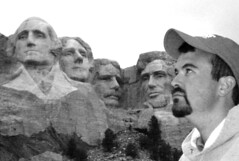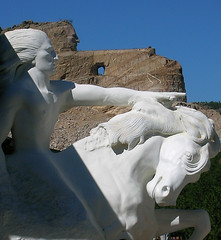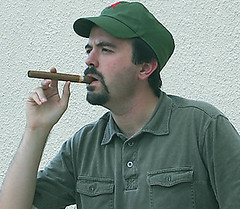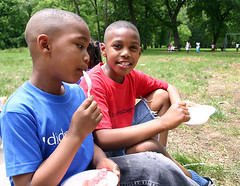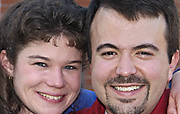(By Erik)
The Home Depot doesn't carry wallpaper (at least not the one by the mall).
Friday, June 30, 2006
Tuesday, June 27, 2006
NEWS: Churches mourn deaths of longtime missionaries Cyndi Chowning and Dan Hardin
NOTE: This story originally appeared on the Chronicle's Web site, but was erased after a hacker broke into the system and replaced the text (see more details in the previous blog entry, below).
By Erik Tryggestad
The Christian Chronicle
Churches of Christ in Texas and around the globe are mourning the recent deaths of two longtime missionaries — Cyndi Chowning and Dan Hardin.
Chowning, pictured below with her husband, Richard, died June 14 during a church meeting in the West African nation of Benin. The Chownings have worked among the Aja people in Benin since 1997.
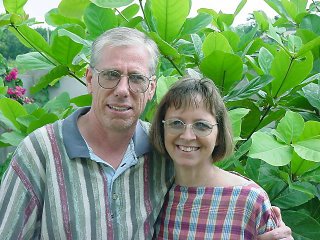
Cyndi Chowning was retrieving something from her vehicle during the meeting when she was hit by a motorcycle, according to a fellow missionary.
Her husband rushed her to the hospital in the nearby town of Azove, in hopes that she could be stabilized for the trip to a larger hospital in Cotonou. But Cyndi Chowning died in Azove from injuries sustained in the accident.
“Cyndi was loved by so many Aja Christians,” said Randy Vaughn, a missionary in Aplahoue, Benin. “She served them humbly, quietly, faithfully and always with great passion.”
Her funeral was scheduled for 4 p.m. Saturday, June 24, at the Park Avenue Church of Christ in Denison, Texas, where the Chownings’ son-in-law, Wes Encalade, serves as youth and family minister.
Family members requested memorial contributions to assist in completion of a clinic and primary school in Benin.
Hardin, 73, died June 19 at a hospital in Austin, Texas, after a long illness.
Hardin and his wife, Joyce, pictured below, served as missionaries to Korea from the late 1950s until the mid-1970s. Dan Hardin served as president of Korea Christian University.

Sid Allen, a missionary with Texas-based Rapha International, described Dan Hardin as "a coworker, mentor and friend." The two met in 1958 at a retreat for church members serving in the military in South Korea, where Allen served in the Air Force.
Dan Hardin had multiple graduate degrees and was fluent in the Korean language. He developed rheumatoid arthritis in the early 1970s, "but did not let misshaped hands and feet keep him from getting on with life," Allen said.
After returning to the United States, Dan Hardin taught missions at Abilene Christian University in Texas. The couple later moved to Lubbock and served Lubbock Christian University for 24 years. Dan Hardin chaired the Bible department and Joyce Hardin served chaired the school's education department until she retired in 2000.
Dan and Joyce Hardin were active in the work of Missions Resource Network in Bedford, Texas, and were members of the Lake Travis Church of Christ in Lakeway, Texas. Dan Hardin served as a minister and elder of the congregation.
"He was an innovative educator and author," Allen said. "He excelled in hobbies — artist, master magician, scuba diver, locksmith, carpentry and computer programming, among others."
The Westover Hills Church of Christ in Austin hosted Dan Hardin’s funeral June 22.
MEMORIAL CONTRIBUTIONS
Memorial donations for Cyndi Chowning may be sent to the Chownings’ sponsoring congregation:
Homewood Church of Christ
265 W. Oxmoor Rd
Birmingham, AL 35209
Attn: Cyndi Chowning memorial
Memorial donations for Dan Hardin may be sent to the Samoa Missions Fund:
Lake Travis Church of Christ.
P.O. Box 340730
Austin, TX 78734
Attn: Samoa Missions Fund
By Erik Tryggestad
The Christian Chronicle
Churches of Christ in Texas and around the globe are mourning the recent deaths of two longtime missionaries — Cyndi Chowning and Dan Hardin.
Chowning, pictured below with her husband, Richard, died June 14 during a church meeting in the West African nation of Benin. The Chownings have worked among the Aja people in Benin since 1997.

Cyndi Chowning was retrieving something from her vehicle during the meeting when she was hit by a motorcycle, according to a fellow missionary.
Her husband rushed her to the hospital in the nearby town of Azove, in hopes that she could be stabilized for the trip to a larger hospital in Cotonou. But Cyndi Chowning died in Azove from injuries sustained in the accident.
“Cyndi was loved by so many Aja Christians,” said Randy Vaughn, a missionary in Aplahoue, Benin. “She served them humbly, quietly, faithfully and always with great passion.”
Her funeral was scheduled for 4 p.m. Saturday, June 24, at the Park Avenue Church of Christ in Denison, Texas, where the Chownings’ son-in-law, Wes Encalade, serves as youth and family minister.
Family members requested memorial contributions to assist in completion of a clinic and primary school in Benin.
Hardin, 73, died June 19 at a hospital in Austin, Texas, after a long illness.
Hardin and his wife, Joyce, pictured below, served as missionaries to Korea from the late 1950s until the mid-1970s. Dan Hardin served as president of Korea Christian University.

Sid Allen, a missionary with Texas-based Rapha International, described Dan Hardin as "a coworker, mentor and friend." The two met in 1958 at a retreat for church members serving in the military in South Korea, where Allen served in the Air Force.
Dan Hardin had multiple graduate degrees and was fluent in the Korean language. He developed rheumatoid arthritis in the early 1970s, "but did not let misshaped hands and feet keep him from getting on with life," Allen said.
After returning to the United States, Dan Hardin taught missions at Abilene Christian University in Texas. The couple later moved to Lubbock and served Lubbock Christian University for 24 years. Dan Hardin chaired the Bible department and Joyce Hardin served chaired the school's education department until she retired in 2000.
Dan and Joyce Hardin were active in the work of Missions Resource Network in Bedford, Texas, and were members of the Lake Travis Church of Christ in Lakeway, Texas. Dan Hardin served as a minister and elder of the congregation.
"He was an innovative educator and author," Allen said. "He excelled in hobbies — artist, master magician, scuba diver, locksmith, carpentry and computer programming, among others."
The Westover Hills Church of Christ in Austin hosted Dan Hardin’s funeral June 22.
MEMORIAL CONTRIBUTIONS
Memorial donations for Cyndi Chowning may be sent to the Chownings’ sponsoring congregation:
Homewood Church of Christ
265 W. Oxmoor Rd
Birmingham, AL 35209
Attn: Cyndi Chowning memorial
Memorial donations for Dan Hardin may be sent to the Samoa Missions Fund:
Lake Travis Church of Christ.
P.O. Box 340730
Austin, TX 78734
Attn: Samoa Missions Fund
Monday, June 26, 2006
Trying not to get hacked about getting hacked
(By Erik)
Today was a weird day — weird in a bad way.
A few days earlier I wrote a story for the Chronicle’s Web site about the tragic death of a missionary in the West African country of Benin — Cyndi Chowning. Cyndi and her husband, Richard, have been great sources. They’ve been doing a wonderful work among a group of people known as the Aja.
I added to the story the sad news of the death of longtime missionary and missions professor Dan Hardin. Dan and his wife, Joyce, have been great sources about the work in Asia and I’ve greatly valued their assistance.
Tamie Ross, our online editor, got the story on the site for me on Friday. Earlier today, e-mailed all of my international contacts and provided them with a link to the story.
About lunchtime here in Oklahoma someone hacked into the Chronicle’s Web site and replaced the text of my story with a profanity-laced declaration that basically read, “Ha ha, I hacked your site.”
That’s a kinder, gentler, paraphrase of what he wrote. I’m amazed that some people have the technical prowess to hack through multiple layers of security, yet can’t spell simple words. The hacker claimed that, instead of praying to the one true God, he was “preying to the metal gods.”
It’s praying to the metal gods. Preying is what you were doing to our Web site. If you’re going to go to the trouble of desecrating our site, at least do us the courtesy of a grammar check.
Anyway, this all happened just about at the same time that many of my contacts were opening their e-mail and following the link. Not good!
Our Web administrator restored our site to its previous state, although my story got lost in the shuffle and I can’t figure out how to get it back. So I may include it on this blog tomorrow.
In our Bible study tonight we talked about a man named Shimei. He was a relative of Saul, and as a result he had a longtime hatred of King David. When David was fleeing from his son, Absalom, Shemei followed alongside David and threw stones and cursed at him. (This is in 2 Samuel 16 or thereabout.)
Abishai, one of David’s men, wanted to kill Shimei, but David told him to stay his hand. “Let him curse, for the Lord has told him to,” David said. “It may be that the Lord will see my distress and repay me with good for the cursing I am receiving today."
Later David returned to his throne, and Shimei begged his forgiveness. Again Abishai wanted to kill him, but David let him live. Still later, just before he died, David told his son, Solomon, to kill Shimei.
The story ends badly, but I think that — at least for a while — David did the right thing.
It’s very frustrating to me that the hacker chose my story — about the loss of two great missionaries — as a target for his prank.
But I forgive him, even though he’s unlikely to ever ask for my forgiveness.
(Incidentally, if you’re wondering who the “metal gods” are, I believe the pantheon includes Iron Maiden, Ozzy, Judas Priest and Jethro Tull — a controversial choice that only made it into this select group because in 1989 they won the first Grammy awarded in the category of ‘hard rock/heavy metal’ album, much to the dismay of fans of also-nominated Metallica. It's probably better if you don't ask me how I know all this.)
Today was a weird day — weird in a bad way.
A few days earlier I wrote a story for the Chronicle’s Web site about the tragic death of a missionary in the West African country of Benin — Cyndi Chowning. Cyndi and her husband, Richard, have been great sources. They’ve been doing a wonderful work among a group of people known as the Aja.
I added to the story the sad news of the death of longtime missionary and missions professor Dan Hardin. Dan and his wife, Joyce, have been great sources about the work in Asia and I’ve greatly valued their assistance.
Tamie Ross, our online editor, got the story on the site for me on Friday. Earlier today, e-mailed all of my international contacts and provided them with a link to the story.
About lunchtime here in Oklahoma someone hacked into the Chronicle’s Web site and replaced the text of my story with a profanity-laced declaration that basically read, “Ha ha, I hacked your site.”
That’s a kinder, gentler, paraphrase of what he wrote. I’m amazed that some people have the technical prowess to hack through multiple layers of security, yet can’t spell simple words. The hacker claimed that, instead of praying to the one true God, he was “preying to the metal gods.”
It’s praying to the metal gods. Preying is what you were doing to our Web site. If you’re going to go to the trouble of desecrating our site, at least do us the courtesy of a grammar check.
Anyway, this all happened just about at the same time that many of my contacts were opening their e-mail and following the link. Not good!
Our Web administrator restored our site to its previous state, although my story got lost in the shuffle and I can’t figure out how to get it back. So I may include it on this blog tomorrow.
In our Bible study tonight we talked about a man named Shimei. He was a relative of Saul, and as a result he had a longtime hatred of King David. When David was fleeing from his son, Absalom, Shemei followed alongside David and threw stones and cursed at him. (This is in 2 Samuel 16 or thereabout.)
Abishai, one of David’s men, wanted to kill Shimei, but David told him to stay his hand. “Let him curse, for the Lord has told him to,” David said. “It may be that the Lord will see my distress and repay me with good for the cursing I am receiving today."
Later David returned to his throne, and Shimei begged his forgiveness. Again Abishai wanted to kill him, but David let him live. Still later, just before he died, David told his son, Solomon, to kill Shimei.
The story ends badly, but I think that — at least for a while — David did the right thing.
It’s very frustrating to me that the hacker chose my story — about the loss of two great missionaries — as a target for his prank.
But I forgive him, even though he’s unlikely to ever ask for my forgiveness.
(Incidentally, if you’re wondering who the “metal gods” are, I believe the pantheon includes Iron Maiden, Ozzy, Judas Priest and Jethro Tull — a controversial choice that only made it into this select group because in 1989 they won the first Grammy awarded in the category of ‘hard rock/heavy metal’ album, much to the dismay of fans of also-nominated Metallica. It's probably better if you don't ask me how I know all this.)
Saturday, June 24, 2006
Sweet home South Dakota
(By Erik)
I promised I’d write more about my trip to South Dakota when I had time. I never really have enough time to do nearly as much writing as I’d like, so let me take this time (when I should be preparing to teach Sunday school tomorrow) to tell a little bit about the good folks at the Northern Hills Church of Christ.
The congregation of about 150 members meets in a nice, newly built facility between the towns of Spearfish and Belle Fourche in western South Dakota, just a few miles from the Wyoming border. It’s the latest church to be featured in the Chronicle’s ongoing series Churches That Work. Click here to read stories from the previous Churches That Work feature on the Southern Hills Church of Christ in Dallas.
Speaking of which, I think it’s funny that we featured the Southern Hills church in May and will feature the Northern Hills church in August. That’s a total coincidence. We didn’t even know the church in South Dakota was named Northern Hills. We just thought it was the Spearfish Church of Christ.
Which is an interesting part of the story. The church was in Spearfish back in 1998 when two missionaries from Oklahoma, Ken Tackett and Jerry Savage, moved to the area. They had been looking to do domestic church planting in the Northwest, but the small congregation in Spearfish contacted them during their search and basically gave them the Macedonian call: “Come up here and help us.”
After a few years of working with the church in Spearfish, the congregation merged with a small church in Belle Fourche and built a new building on a highway between the two towns. Now it’s arguably the largest congregation of Churches of Christ in the Dakotas — North and South. Not bad for a community with a combined population of less than 20,000!
But that doesn’t tell the whole story. The Spearfish area itself is a picturesque paradise (which took me by surprise, as I’m more used to the less scenic, eastern part of the state — no offense to my grandma in Sioux Falls). Thousands of tourists visit Spearfish Canyon, drive the Needles Highway and visit the “Four Faces” along with the monument-in-progress to Crazy Horse.
If you’re familiar with the trend of Californians packing up and moving to Montana, well, it doesn’t stop there. Contractors are building million-dollar homes in western South Dakota. New ones are going up everywhere. Wagons East, I guess.
Oh, and there’s a little town nearby called Sturgis. Harley Davidson enthusiasts already are showing up there. I saw plenty of bikes during my brief visit. Ken Tackett told me to take the sound of one of the bikes, multiply it by about 10,000, and you’ve pretty much got an idea of what it will sound like there in a couple of months.
Many of Spearfish’s residents lament the annual bike rally, but everybody realizes it’s the backbone of the region’s economy. Some hotels open only for the two months around the August rally and then close for the rest of the year.
Bikers aside, what impressed me most about the visit was the sincerity and honesty of the people I met. I was told that interviews would be difficult and that people in South Dakota aren’t as open or as friendly as folks “down in the South.” I disagree. The South Dakotans I met were eager to talk about what God has done in their lives. A lot of them came from religious backgrounds where they didn’t study the Bible much, and they really like the “let’s look it up and talk about it” approach taken by the missionaries.
It’s an amazing and wonderful thing to see God working in the lives of so many people, far outside the Bible Belt as we know it. The church’s energy is contagious.
Ken Tackett took the photo of me at Rushmore, by the way. I thought it turned out really neat. You’ve gotta be a local to know how to take that shot! I stayed with the Tacketts during my visit. They were great hosts. Had a blast.
I promised I’d write more about my trip to South Dakota when I had time. I never really have enough time to do nearly as much writing as I’d like, so let me take this time (when I should be preparing to teach Sunday school tomorrow) to tell a little bit about the good folks at the Northern Hills Church of Christ.
The congregation of about 150 members meets in a nice, newly built facility between the towns of Spearfish and Belle Fourche in western South Dakota, just a few miles from the Wyoming border. It’s the latest church to be featured in the Chronicle’s ongoing series Churches That Work. Click here to read stories from the previous Churches That Work feature on the Southern Hills Church of Christ in Dallas.
Speaking of which, I think it’s funny that we featured the Southern Hills church in May and will feature the Northern Hills church in August. That’s a total coincidence. We didn’t even know the church in South Dakota was named Northern Hills. We just thought it was the Spearfish Church of Christ.
Which is an interesting part of the story. The church was in Spearfish back in 1998 when two missionaries from Oklahoma, Ken Tackett and Jerry Savage, moved to the area. They had been looking to do domestic church planting in the Northwest, but the small congregation in Spearfish contacted them during their search and basically gave them the Macedonian call: “Come up here and help us.”
After a few years of working with the church in Spearfish, the congregation merged with a small church in Belle Fourche and built a new building on a highway between the two towns. Now it’s arguably the largest congregation of Churches of Christ in the Dakotas — North and South. Not bad for a community with a combined population of less than 20,000!
But that doesn’t tell the whole story. The Spearfish area itself is a picturesque paradise (which took me by surprise, as I’m more used to the less scenic, eastern part of the state — no offense to my grandma in Sioux Falls). Thousands of tourists visit Spearfish Canyon, drive the Needles Highway and visit the “Four Faces” along with the monument-in-progress to Crazy Horse.
If you’re familiar with the trend of Californians packing up and moving to Montana, well, it doesn’t stop there. Contractors are building million-dollar homes in western South Dakota. New ones are going up everywhere. Wagons East, I guess.
Oh, and there’s a little town nearby called Sturgis. Harley Davidson enthusiasts already are showing up there. I saw plenty of bikes during my brief visit. Ken Tackett told me to take the sound of one of the bikes, multiply it by about 10,000, and you’ve pretty much got an idea of what it will sound like there in a couple of months.
Many of Spearfish’s residents lament the annual bike rally, but everybody realizes it’s the backbone of the region’s economy. Some hotels open only for the two months around the August rally and then close for the rest of the year.
Bikers aside, what impressed me most about the visit was the sincerity and honesty of the people I met. I was told that interviews would be difficult and that people in South Dakota aren’t as open or as friendly as folks “down in the South.” I disagree. The South Dakotans I met were eager to talk about what God has done in their lives. A lot of them came from religious backgrounds where they didn’t study the Bible much, and they really like the “let’s look it up and talk about it” approach taken by the missionaries.
It’s an amazing and wonderful thing to see God working in the lives of so many people, far outside the Bible Belt as we know it. The church’s energy is contagious.
Ken Tackett took the photo of me at Rushmore, by the way. I thought it turned out really neat. You’ve gotta be a local to know how to take that shot! I stayed with the Tacketts during my visit. They were great hosts. Had a blast.
Thursday, June 22, 2006
James' upside-down world of suffering
(By Erik)
A couple of weeks ago Jeanie and I went to Altus, Okla., where I preached Sunday morning and night. The congregation is looking for a new minister, and I’m honored that they’re letting me help fill in the gap.
(In between sermons, my in-laws loaded me down with birthday presents. Whoo-hoo!)
I’m including some of my sermon notes from the Sunday a.m. service, “James’ upside-down world of suffering.” I borrowed heavily from a Sunday school series we did at Memorial Road a few months ago.
I began by mentioning that Jeanie and I were about to celebrate our third wedding anniversary, but that the auditorium where we were married (just a few feet away from where I was preaching this sermon) was no more. It was destroyed in a fire, but the fellowship hall was spared. That’s where the church meets now.
The church in Altus — just like all churches — has suffered other losses and pain. Death and sickness always are with us, yet we continue to meet together to praise God. As it says in Habakkuk 3:17-18:
“Though the fig tree does not bud and there are no grapes on the vines, though the olive crop fails and the fields produce no food, though there are no sheep in the pen and no cattle in the stalls, yet I will rejoice in the LORD, I will be joyful in God my Savior.”
To the outside world this has to look a bit ridiculous, because they might be tempted to say, “Whatever you’re doing doesn’t seem to be working.”
But our faith also gives us mechanisms for coping with suffering and loss. The most memorable verses on the subject are from the book of James:
James 1:2-4, “Consider it pure joy, my brothers, whenever you face trials of many kinds, because you know that the testing of your faith develops perseverance. Perseverance must finish its work so that you may be mature and complete, not lacking anything.”
If you’re like me, you’ve heard those verses over and over since you were a kid.
If you read the rest of the book of James, his instructions are very simple and direct. Be patient. Don’t oppress people. Don’t slander one another. Submit yourselves to God. Don’t boast.
This seems to imply that the people who are undergoing the suffering mentioned in the first verses are handling it quite badly. Maybe they’re taking out their frustrations on each other, through bad-mouthing each other and looking down on the poor. Do we do that today?
That’s not the proper way to deal with suffering, which, as James said in the first verses, is necessary to build perseverance.
Go back to James 1 and look at the verses just after what we just read:
James 1:5-8, “If any of you lacks wisdom, he should ask God, who gives generously to all without finding fault, and it will be given to him. But when he asks, he must believe and not doubt, because he who doubts is like a wave of the sea, blown and tossed by the wind. That man should not think he will receive anything from the Lord; he is a double-minded man, unstable in all he does.
You’re probably familiar with these verses, too. But what do they have to do with verses 2-4? I’ve read these separately for years (as parts of different Bible lessons) and have never seen how they connect.
But there is a connection here. What is wisdom, and what does it have to do with suffering?
One of my favorite definitions of wisdom is “applied knowledge.” It goes beyond facts, doesn’t it? Someone who possesses wisdom isn’t going to just tell you the situation. He or she also will tell you how best to respond to it.
If I tell you there’s a hole in the ground, I’m giving you knowledge of a situation. If I tell you there’s a hole in the ground, so go around it, but go around it on the left side because the right side is slippery and the ground is soft and you might fall in — that seems more like dispensing wisdom to me.
And how did I gain that wisdom? More than likely, I tried the right side of the hole and fell in. So suffering is a path to wisdom, and maybe James puts these verses about wisdom here so that we would know to ask for wisdom to deal with suffering.
Or is it possible that James is telling his readers to ask for suffering in order to gain wisdom?
2 Corinthians 1:5, “For just as the sufferings of Christ flow over into our lives, so also through Christ our comfort overflows.”
1 Peter 4:12-13, “Dear friends, do not be surprised at the painful trial you are suffering, as though something strange were happening to you. But rejoice that you participate in the sufferings of Christ, so that you may be overjoyed when his glory is revealed.”
The message in these verses seems to go beyond “Just hang on and God will get you through it.” Look at some more verses in the first chapter of James:
James 1:9-12, “The brother in humble circumstances ought to take pride in his high position. But the one who is rich should take pride in his low position, because he will pass away like a wild flower. For the sun rises with scorching heat and withers the plant; its blossom falls and its beauty is destroyed. In the same way, the rich man will fade away even while he goes about his business. Blessed is the man who perseveres under trial, because when he has stood the test, he will receive the crown of life that God has promised to those who love him.”
James turns the world of suffering upside down. I know that when I’m going through trials, the last thing I’m thinking about is rejoicing. But if you look up at verse 1 of James 1, you’ll see the word “Greetings.” Perhaps a better translation is “Rejoice!”
Suffering is something more than just something to be endured. If it’s necessary to build perseverance, then people who suffer should rejoice. That’s a hard pill to swallow. I’d much rather avoid trials than go through them.
What James seems to be saying here is, “Hey, if you’re poor, congrats! You have to suffer so perseverance can finish its work, and if you’re poor, you’ll probably suffer quite a bit. You’re very lucky to hold this high position.”
“And if you’re rich, well, condolences. You guys have it a lot better and don’t suffer nearly as much as the poor. But take heart, chances are you’ll lose all of your riches sooner or later and then you’re right down there suffering alongside the poor. God will work it out!”
After the list of instructions we talked about earlier, James revisits the central them of suffering and tells us, most of all, to be patient.
James 5:7-8, “Be patient, then, brothers, until the Lord's coming. See how the farmer waits for the land to yield its valuable crop and how patient he is for the autumn and spring rains. You too, be patient and stand firm, because the Lord's coming is near.”
Suffering is both necessary and mercifully temporary.
The reason that we’re going through what we’re going through is that we live in a fallen world. We mistakenly ask “Why is God doing this to me?” when he’s really not. There are other forces at work in this world — we don’t give the devil enough credit these days — that mean to do us harm, but God protects us.
He doesn’t allow us to be tempted beyond what we can bear, and he gives us life that will make our present sufferings look miniscule.
Romans 8:18-21, “I consider that our present sufferings are not worth comparing with the glory that will be revealed to us. The creation waits in eager expectation for the sons of God to be revealed. For the creation was subjected to frustration, not by its own choice, but by the will of the one who subjected it, in hope that the creation itself will be liberated from its bondage to decay and brought into the glorious freedom of the children of God.
A couple of weeks ago Jeanie and I went to Altus, Okla., where I preached Sunday morning and night. The congregation is looking for a new minister, and I’m honored that they’re letting me help fill in the gap.
(In between sermons, my in-laws loaded me down with birthday presents. Whoo-hoo!)
I’m including some of my sermon notes from the Sunday a.m. service, “James’ upside-down world of suffering.” I borrowed heavily from a Sunday school series we did at Memorial Road a few months ago.
I began by mentioning that Jeanie and I were about to celebrate our third wedding anniversary, but that the auditorium where we were married (just a few feet away from where I was preaching this sermon) was no more. It was destroyed in a fire, but the fellowship hall was spared. That’s where the church meets now.
The church in Altus — just like all churches — has suffered other losses and pain. Death and sickness always are with us, yet we continue to meet together to praise God. As it says in Habakkuk 3:17-18:
“Though the fig tree does not bud and there are no grapes on the vines, though the olive crop fails and the fields produce no food, though there are no sheep in the pen and no cattle in the stalls, yet I will rejoice in the LORD, I will be joyful in God my Savior.”
To the outside world this has to look a bit ridiculous, because they might be tempted to say, “Whatever you’re doing doesn’t seem to be working.”
But our faith also gives us mechanisms for coping with suffering and loss. The most memorable verses on the subject are from the book of James:
James 1:2-4, “Consider it pure joy, my brothers, whenever you face trials of many kinds, because you know that the testing of your faith develops perseverance. Perseverance must finish its work so that you may be mature and complete, not lacking anything.”
If you’re like me, you’ve heard those verses over and over since you were a kid.
If you read the rest of the book of James, his instructions are very simple and direct. Be patient. Don’t oppress people. Don’t slander one another. Submit yourselves to God. Don’t boast.
This seems to imply that the people who are undergoing the suffering mentioned in the first verses are handling it quite badly. Maybe they’re taking out their frustrations on each other, through bad-mouthing each other and looking down on the poor. Do we do that today?
That’s not the proper way to deal with suffering, which, as James said in the first verses, is necessary to build perseverance.
Go back to James 1 and look at the verses just after what we just read:
James 1:5-8, “If any of you lacks wisdom, he should ask God, who gives generously to all without finding fault, and it will be given to him. But when he asks, he must believe and not doubt, because he who doubts is like a wave of the sea, blown and tossed by the wind. That man should not think he will receive anything from the Lord; he is a double-minded man, unstable in all he does.
You’re probably familiar with these verses, too. But what do they have to do with verses 2-4? I’ve read these separately for years (as parts of different Bible lessons) and have never seen how they connect.
But there is a connection here. What is wisdom, and what does it have to do with suffering?
One of my favorite definitions of wisdom is “applied knowledge.” It goes beyond facts, doesn’t it? Someone who possesses wisdom isn’t going to just tell you the situation. He or she also will tell you how best to respond to it.
If I tell you there’s a hole in the ground, I’m giving you knowledge of a situation. If I tell you there’s a hole in the ground, so go around it, but go around it on the left side because the right side is slippery and the ground is soft and you might fall in — that seems more like dispensing wisdom to me.
And how did I gain that wisdom? More than likely, I tried the right side of the hole and fell in. So suffering is a path to wisdom, and maybe James puts these verses about wisdom here so that we would know to ask for wisdom to deal with suffering.
Or is it possible that James is telling his readers to ask for suffering in order to gain wisdom?
2 Corinthians 1:5, “For just as the sufferings of Christ flow over into our lives, so also through Christ our comfort overflows.”
1 Peter 4:12-13, “Dear friends, do not be surprised at the painful trial you are suffering, as though something strange were happening to you. But rejoice that you participate in the sufferings of Christ, so that you may be overjoyed when his glory is revealed.”
The message in these verses seems to go beyond “Just hang on and God will get you through it.” Look at some more verses in the first chapter of James:
James 1:9-12, “The brother in humble circumstances ought to take pride in his high position. But the one who is rich should take pride in his low position, because he will pass away like a wild flower. For the sun rises with scorching heat and withers the plant; its blossom falls and its beauty is destroyed. In the same way, the rich man will fade away even while he goes about his business. Blessed is the man who perseveres under trial, because when he has stood the test, he will receive the crown of life that God has promised to those who love him.”
James turns the world of suffering upside down. I know that when I’m going through trials, the last thing I’m thinking about is rejoicing. But if you look up at verse 1 of James 1, you’ll see the word “Greetings.” Perhaps a better translation is “Rejoice!”
Suffering is something more than just something to be endured. If it’s necessary to build perseverance, then people who suffer should rejoice. That’s a hard pill to swallow. I’d much rather avoid trials than go through them.
What James seems to be saying here is, “Hey, if you’re poor, congrats! You have to suffer so perseverance can finish its work, and if you’re poor, you’ll probably suffer quite a bit. You’re very lucky to hold this high position.”
“And if you’re rich, well, condolences. You guys have it a lot better and don’t suffer nearly as much as the poor. But take heart, chances are you’ll lose all of your riches sooner or later and then you’re right down there suffering alongside the poor. God will work it out!”
After the list of instructions we talked about earlier, James revisits the central them of suffering and tells us, most of all, to be patient.
James 5:7-8, “Be patient, then, brothers, until the Lord's coming. See how the farmer waits for the land to yield its valuable crop and how patient he is for the autumn and spring rains. You too, be patient and stand firm, because the Lord's coming is near.”
Suffering is both necessary and mercifully temporary.
The reason that we’re going through what we’re going through is that we live in a fallen world. We mistakenly ask “Why is God doing this to me?” when he’s really not. There are other forces at work in this world — we don’t give the devil enough credit these days — that mean to do us harm, but God protects us.
He doesn’t allow us to be tempted beyond what we can bear, and he gives us life that will make our present sufferings look miniscule.
Romans 8:18-21, “I consider that our present sufferings are not worth comparing with the glory that will be revealed to us. The creation waits in eager expectation for the sons of God to be revealed. For the creation was subjected to frustration, not by its own choice, but by the will of the one who subjected it, in hope that the creation itself will be liberated from its bondage to decay and brought into the glorious freedom of the children of God.
Tuesday, June 20, 2006
PHOTO: Crazy Horse
(By Erik)
Hello from Spearfish, S.D. It's been a while since I posted anything, so I'm putting up this photo I took near Rapid City of the tribute to Indian chief Crazy Horse, I'll post more on my South Dakota trip soon.
Hello from Spearfish, S.D. It's been a while since I posted anything, so I'm putting up this photo I took near Rapid City of the tribute to Indian chief Crazy Horse, I'll post more on my South Dakota trip soon.
Tuesday, June 06, 2006
It's 6-6-6 and I'm 3-3
(By Erik)
That’s right. Today I’m 33. I never thought much about being born on 06/06 — or having a birthday on a day with three 6’s in it. Of course, when I was born it was 06/06/73. Nothing too sinister there. I’ve always thought it was cool that I was born on D-Day, though.
A few people already have told me that I’m now the same age Jesus was when he was crucified. But Curt Niccum disagrees. He says there’s no biblical evidence that Christ died, rose from the dead, and ascended into heaven at age 33. Just some trivia for ya there.
Wish I had something profound to say about turning 33. I’m thankful to God for making it to another year with a wonderful wife, great job, friends, family and easy access to Frisco melts.
That’s right. Today I’m 33. I never thought much about being born on 06/06 — or having a birthday on a day with three 6’s in it. Of course, when I was born it was 06/06/73. Nothing too sinister there. I’ve always thought it was cool that I was born on D-Day, though.
A few people already have told me that I’m now the same age Jesus was when he was crucified. But Curt Niccum disagrees. He says there’s no biblical evidence that Christ died, rose from the dead, and ascended into heaven at age 33. Just some trivia for ya there.
Wish I had something profound to say about turning 33. I’m thankful to God for making it to another year with a wonderful wife, great job, friends, family and easy access to Frisco melts.
Monday, June 05, 2006
PHOTO: It must be summertime
(By Erik)
Nothing says summer like a big bowl of ice cream — as demonstrated by James Walker, on the left, and his brother, Douglas.
I spent the weekend in Kansas City, Mo., (Jeanie was on call at the hospital) and visited a couple of churches for the Chronicle.
The Swope Parkway Church of Christ celebrated its 70th anniversary with a picnic in nearby Swope Park and a special program after services on Sunday. I met a lot of great folks, including Sarah Friday, who's taught third and fourth grades since 1977.
I asked her if kids have changed since she started teaching. "They have," she said. "But I haven't." She said she's a big believer in discipline. I talked to another church member, whose kids were in her class in the late 70s and now have kids of their own. "She'll hold your feet to the fire," he said of sister Friday, "but she'll love you to death."
I also visited the Overland Park Church of Christ just across the border in Kansas. I interviewed their children's minister, Carol Gafford, for an upcoming issue. I also stopped by a camp for kids in rural Kansas on the way home. I'll try to post some photos from that later.
Click on the photo to see a couple of additional ones from the homecoming.
Nothing says summer like a big bowl of ice cream — as demonstrated by James Walker, on the left, and his brother, Douglas.
I spent the weekend in Kansas City, Mo., (Jeanie was on call at the hospital) and visited a couple of churches for the Chronicle.
The Swope Parkway Church of Christ celebrated its 70th anniversary with a picnic in nearby Swope Park and a special program after services on Sunday. I met a lot of great folks, including Sarah Friday, who's taught third and fourth grades since 1977.
I asked her if kids have changed since she started teaching. "They have," she said. "But I haven't." She said she's a big believer in discipline. I talked to another church member, whose kids were in her class in the late 70s and now have kids of their own. "She'll hold your feet to the fire," he said of sister Friday, "but she'll love you to death."
I also visited the Overland Park Church of Christ just across the border in Kansas. I interviewed their children's minister, Carol Gafford, for an upcoming issue. I also stopped by a camp for kids in rural Kansas on the way home. I'll try to post some photos from that later.
Click on the photo to see a couple of additional ones from the homecoming.
Thursday, June 01, 2006
PHOTO: London blooming
(By Erik)
When I traveled to Zimbabwe in early May with a team from the East Point Church of Christ in Kansas, we had a six-hour layover in London, so we took in some of the sights.
It was a bright and hot day. Lots of people were outside, soaking up the rare sunshine.
Click on this photo or the one below to see some additional shots from London.
When I traveled to Zimbabwe in early May with a team from the East Point Church of Christ in Kansas, we had a six-hour layover in London, so we took in some of the sights.
It was a bright and hot day. Lots of people were outside, soaking up the rare sunshine.
Click on this photo or the one below to see some additional shots from London.
PHOTO: United colors of London
(By Erik)
Here's another photo from London. Notice the signature, double-decker bus in the background. Added a nice splash of red to the photo, I thougt. Click on it to see a slightly larger version, if you're so inclined.
Here's another photo from London. Notice the signature, double-decker bus in the background. Added a nice splash of red to the photo, I thougt. Click on it to see a slightly larger version, if you're so inclined.
Subscribe to:
Comments (Atom)

